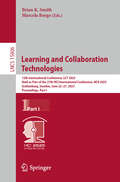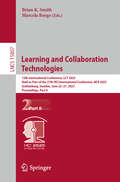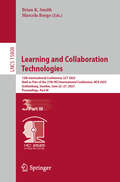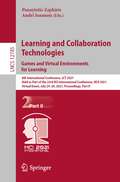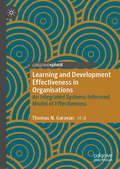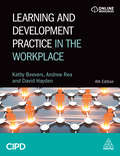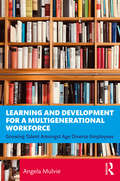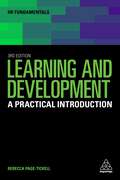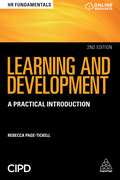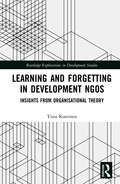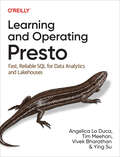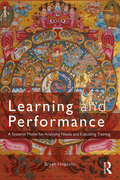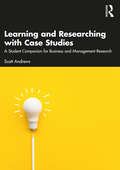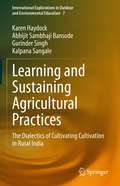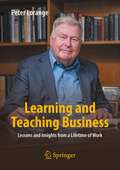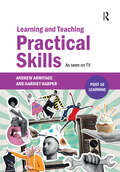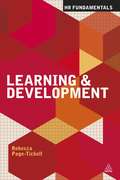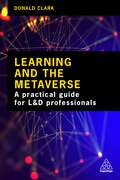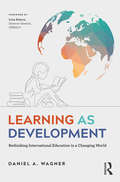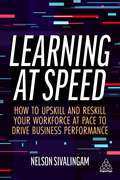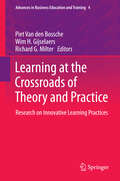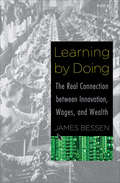- Table View
- List View
Learning and Collaboration Technologies: 12th International Conference, LCT 2025, Held as Part of the 27th HCI International Conference, HCII 2025, Gothenburg, Sweden, June 22–27, 2025, Proceedings, Part I (Lecture Notes in Computer Science #15806)
by Brian K. Smith Marcela BorgeThe three-volume set LNCS 15806–15808 constitutes the thoroughly refereed proceedings of the 12th International Conference on Learning and Collaboration Technologies, LCT 2025, held as part of the 27th International Conference, HCI International 2025, which took place in Gothenburg, Sweden, June 22-17, 2025. The total of 1430 papers and 355 posters included in the HCII 2025 proceedings was carefully reviewed and selected from 7972 submissions. The papers have been organized in topical sections as follows: Part I: Designing Learning Experiences; Technological Innovation in EducationPart II: From Human Teachers to AI Educators; Intelligent Learning Environments Part III: Serious Games and Gamification; Immersive Learning; Understanding Learning Experiences
Learning and Collaboration Technologies: 12th International Conference, LCT 2025, Held as Part of the 27th HCI International Conference, HCII 2025, Gothenburg, Sweden, June 22–27, 2025, Proceedings, Part II (Lecture Notes in Computer Science #15807)
by Brian K. Smith Marcela BorgeThe three-volume set LNCS 15806–15808 constitutes the thoroughly refereed proceedings of the 12th International Conference on Learning and Collaboration Technologies, LCT 2025, held as part of the 27th International Conference, HCI International 2025, which took place in Gothenburg, Sweden, June 22-17, 2025. The total of 1430 papers and 355 posters included in the HCII 2025 proceedings was carefully reviewed and selected from 7972 submissions. The papers have been organized in topical sections as follows: Part I: Designing Learning Experiences; Technological Innovation in EducationPart II: From Human Teachers to AI Educators; Intelligent Learning Environments Part III: Serious Games and Gamification; Immersive Learning; Understanding Learning Experiences
Learning and Collaboration Technologies: 12th International Conference, LCT 2025, Held as Part of the 27th HCI International Conference, HCII 2025, Gothenburg, Sweden, June 22–27, 2025, Proceedings, Part III (Lecture Notes in Computer Science #15808)
by Brian K. Smith Marcela BorgeThe three-volume set LNCS 15806–15808 constitutes the thoroughly refereed proceedings of the 12th International Conference on Learning and Collaboration Technologies, LCT 2025, held as part of the 27th International Conference, HCI International 2025, which took place in Gothenburg, Sweden, June 22-17, 2025. The total of 1430 papers and 355 posters included in the HCII 2025 proceedings was carefully reviewed and selected from 7972 submissions. The papers have been organized in topical sections as follows: Part I: Designing Learning Experiences; Technological Innovation in EducationPart II: From Human Teachers to AI Educators; Intelligent Learning Environments Part III: Serious Games and Gamification; Immersive Learning; Understanding Learning Experiences
Learning and Collaboration Technologies: 8th International Conference, LCT 2021, Held as Part of the 23rd HCI International Conference, HCII 2021, Virtual Event, July 24–29, 2021, Proceedings, Part II (Lecture Notes in Computer Science #12785)
by Panayiotis Zaphiris Andri IoannouThis two-volume set LNCS 12774 and 12775 constitutes the refereed proceedings of the 8th International Conference on Learning and Collaboration Technologies, LCT 2021, held as Part of the 23rd International Conference, HCI International 2021, which took place in July 2021. Due to COVID-19 pandemic the conference was held virtually. The total of 1276 papers and 241 poster papers included in the 39 HCII 2021 proceedings volumes was carefully reviewed and selected from 5222 submissions. The regular papers of LCT 2021, Part II, focus on Games and Gamification in Learning; Chatbots in Learning; AR, VR and Robots in Learning.
Learning and Development Effectiveness in Organisations: An Integrated Systems-Informed Model of Effectiveness
by Ronan Carbery James Duggan Thomas N. Garavan Maura Sheehan Fergal O’Brien Claire Gubbins Yanqing Lai Sinead Heneghan Ronnie Lannon Kirsteen GrantThis book offers an integrated and contextualised framework for learning and development (L&D) effectiveness that addresses both the nature of L&D and its antecedents and outcomes in organisations. Scholars and practitioners alike have recognised the important role that L&D plays in organisations, where the development of human capital is an essential component of individual employability, career advancement, organisational performance, and competitive advantage. The development of employees’ knowledge, skills, and attitudes constitutes one of the most important HR challenges that organisations face. The evidence indicates that organisations continue to invest in L&D programmes as part of their HR strategy. In addition, there has been an enormous growth in research on L&D in organisations; however, there is some ambiguity concerning the effectiveness of these activities and it largely remains unclear how they can be best implemented. This book seeks to address this gap in the literature. The authors propose a framework for L&D effectiveness based on key findings from reviews, empirical research, and meta-analyses, as well as previously established theoretical frameworks within the field. Combining theory and practice, the new framework this book offers provides key guidance for L&D practitioners and researches interested in the area.
Learning and Development Practice in the Workplace
by Kathy Beevers Andrew Rea David HaydenLearning and Development Practice in the Workplace is the ideal textbook for anyone studying CIPD L&D qualifications and apprenticeships at Level 3 or Level 5, as well as for practitioners new to an L&D role. It covers what is required of an L&D professional and how to meet and exceed these expectations, how to align L&D activity with organisational strategy and, crucially, how to identify learning needs and design effective L&D practice.This new edition of Learning and Development Practice in the Workplace has been fully updated, reflecting the new CIPD Profession Map, and now has dedicated chapters on the different approaches to learning delivery, including face-to-face training and facilitation, technology-based learning, coaching, mentoring and social and collaborative learning. There is also expert guidance on learner engagement including insights from neuroscience and psychology, as well as advice on evaluating the impact of L&D. With case studies, activities and examples throughout, this new edition is an indispensable guide for students and new practitioners alike. Online supporting resources include lecture slides, annotated web links and self-test questions.
Learning and Development for a Multigenerational Workforce: Growing Talent Amongst Age Diverse Employees
by Angela MulvieAs the topic of age diversity in the workplace becomes increasingly important, this book is the first to show how organizations can provide learning and development opportunities and activities for a mixed generational workforce, and how to deal with the issues arising from such a strategy. Going beyond the theory, the book uncovers how learning and development for a multigenerational workforce works in practice and provides case studies throughout. Key themes include: • how organizations can determine the learning and development needs of a multigenerational workforce, and the psychology of learning for different groups; • how a strategy for learning and development for a mixed generation workforce can be established and delivered; • the resource implications of this provision and how organisations dealing with them to ensure flexibility; and • how the outcomes and impact of such provision can be measured. With both research-based and practical content, the book is suitable for both Master’s level programmes in HRM and HRD, and for learning and development professionals.
Learning and Development: A Practical Introduction (HR Fundamentals #25)
by Rebecca Page-TickellHow can learning initiatives contribute to employee and organizational success? This is a practical introduction to the principles of designing and delivering effective training and L&D programmes. Providing diagnostic tools, scenarios and case studies, Learning and Development demonstrates how to link learning to strategic business goals and explores both the benefits and complexities associated with L&D. This updated third edition features a new chapter on designing learning interventions, covering technology-led development and the impact of virtual learning. There is also guidance on making learning and development strategies accessible and inclusive for all employees, and information on metrics that can be used for measuring effectiveness.Learning and Development features guidance in essential areas including identifying L&D needs, selecting the most appropriate types of intervention and the processes of measurement and evaluation. Online resources include extended case studies, an annotated literature review and self-evaluation tools.HR Fundamentals is a series of succinct, practical guides featuring exercises, examples and case studies. They are ideal for students and those in the early stages of their HR careers.
Learning and Development: A Practical Introduction (HR Fundamentals #7)
by Rebecca Page-TickellIn today's complex, uncertain and ambiguous business environment, it is essential to develop a workforce's capabilities, skills and competencies to ensure continued organizational success. Learning and Development is a practical guide to the principles of effectively designing and delivering training and L&D programmes in organizations of any size. It demonstrates how to link learning to strategic business goals and explores the benefits of L&D and the complexities associated with it. Using a combination of diagnostic tools, scenarios and case studies, this essential book builds knowledge in areas including identifying L&D needs, selecting the most appropriate types of intervention and the processes of measurement and evaluation.This updated second edition of Learning and Development covers the latest trends and developments in the field, such as e-learning, gamification and massive open online courses (MOOCs), as well as new material on learning measurement and additional international case studies.HR Fundamentals is a series of succinct, practical guides for students and those in the early stages of their HR careers. They are endorsed by the Chartered Institute of Personnel and Development (CIPD), the UK professional body for HR and people development, which has over 145,000 members worldwide.
Learning and Forgetting in Development NGOs: Insights from Organisational Theory (Routledge Explorations in Development Studies)
by Tiina KontinenLearning and Forgetting in Development NGOs draws on a range of theoretical approaches and empirical evidence to explore how development organisations learn or fail to learn from experience. Despite the overwhelming discourses of NGOs as learning organisations, little is known about the phenomenon of learning within NGOs. As constantly changing buzzwords and institutional approaches abound and old ideas and concepts are "re-discovered", development NGOs are often accused of trying to reinvent the wheel as they struggle to escape from the challenges of development amnesia. Based on detailed empirical data on the everyday practices and accounts of development practitioners, this book moves between the boundaries of organisational institutionalism, learning theories, management and ethnographies of NGOs practices to investigate the many faces of organisational learning in an attempt to counteract development amnesia. Learning and Forgetting in Development NGOs will be an essential guide for students, scholars and development practitioners with an interest in development management and organisational theory.
Learning and Growth Perspective
by Robert S. Kaplan David P. NortonThe objectives established in the financial, customer, and internal-business-process perspectives identify where the organization must excel to achieve breakthrough performance. The objectives in the learning and growth perspective provide the infrastructure to enable ambitious objectives in the other three perspectives to be achieved. In this chapter, the authors contend that organizations must invest in their infrastructure--people, systems, and organizational processes--if they are to achieve ambitious long-term financial growth objectives. This chapter was originally published as chapter 6 of "The Balanced Scorecard: Translating Strategy into Action."
Learning and Operating Presto: Fast, Reliable SQL for Data Analytics and Lakehouses
by Angelica Lo Duca Tim Meehan Vivek Bharathan Ying SuThe Presto community has mushroomed since its origins at Facebook in 2012. But ramping up this open source distributed SQL query engine can be challenging even for the most experienced engineers. With this practical book, data engineers and architects, platform engineers, cloud engineers, and software engineers will learn how to use Presto operations at your organization to derive insights on datasets wherever they reside. Authors Angelica Lo Duca, Tim Meehan, Vivek Bharathan, and Ying Su explain what Presto is, where it came from, and how it differs from other data warehousing solutions. You'll discover why Facebook, Uber, Alibaba Cloud, Hewlett Packard Enterprise, IBM, Intel, and many more use Presto and how you can quickly deploy Presto in production. With this book, you will: Learn how to install and configure PrestoUse Presto with business intelligence toolsUnderstand how to connect Presto to a variety of data sourcesExtend Presto for real-time business insightLearn how to apply best practices and tuningGet troubleshooting tips for logs, error messages, and moreExplore Presto's architectural concepts and usage patternsUnderstand Presto security and administration
Learning and Performance: A Systemic Model for Analysing Needs and Evaluating Training
by Bryan HopkinsChanging work roles, greater emphasis on individual autonomy, the growing importance of relationships, the complexity of many businesses; all these things call into question the prevailing approach to training needs analysis and evaluation, which still tends to be based on a simple gap analysis between job requirements and an employee's knowledge and skills. Bryan Hopkins's Learning and Performance takes a systemic approach to workplace performance, training needs and the basis on which we can analyse them and evaluate the subsequent training. The author's approach offers a model for HR and training departments that is relevant and sufficiently sophisticated for today's workplaces. As with all his books, Bryan Hopkins combines a complete understanding of learning and organisational theory with pragmatic examples, ensuring a book that will be read and applied in equal measure.
Learning and Researching with Case Studies: A Student Companion for Business and Management Research
by Scott AndrewsThis companion takes the student through the different approaches to working with cases in the classroom, virtually and for research purposes. Capturing insights and best practices shared by scholars of the case method from around the world, this book aims to: • equip students to work with and analyse case studies as part of their programme of study; • adapt student approaches to online learning with cases; • guide students on how to use case studies as a form of assessment; • help students looking to adopt a case study approach to a research project. These aims are framed in the sections of the book. Each section contains reflections from academics across the world, personal insights and lessons learnt from case sessions, templates, and exercises to develop your own skills in learning or researching with cases. Full examples showcase the nature of cases by type and format: short incident, exercise case, situation case; single, sequential and digital cases. This text is for undergraduate and postgraduate Business and Management students, those studying as part of executive education programmes, MBA students, and academics who are using or preparing to use case studies in their learning or research. Online resources include PowerPoint slides, video material and example case studies from around the world.
Learning and Researching with Case Studies: A Student Companion for Business and Management Research
by Scott AndrewsThis companion takes the student through the different approaches to working with cases in the classroom, virtually and for research purposes. Capturing insights and best practices shared by scholars of the case method from around the world, this book aims to:• equip students to work with and analyse case studies as part of their programme of study;• adapt student approaches to online learning with cases;• guide students on how to use case studies as a form of assessment;• help students looking to adopt a case study approach to a research project.These aims are framed in the sections of the book. Each section contains reflections from academics across the world, personal insights and lessons learnt from case sessions, templates, and exercises to develop your own skills in learning or researching with cases. Full examples showcase the nature of cases by type and format: short incident, exercise case, situation case; single, sequential and digital cases.This text is for undergraduate and postgraduate Business and Management students, those studying as part of executive education programmes, MBA students, and academics who are using or preparing to use case studies in their learning or research. Online resources include PowerPoint slides, video material and example case studies from around the world.
Learning and Sustaining Agricultural Practices: The Dialectics of Cultivating Cultivation in Rural India (International Explorations in Outdoor and Environmental Education #7)
by Gurinder Singh Karen Haydock Abhijit Sambhaji Bansode Kalpana SangaleThis book describes a participatory case study of a small family farm in Maharashtra, India. It is a dialectical study of cultivating cultivation: how paddy cultivation is learnt and taught, and why it is the way it is. The paddy cultivation that the family is doing at first appears to be ‘traditional’. But by observation and working along with the family, the authors have found that they are engaging in a dynamic process in which they are questioning, investigating, and learning by doing. The authors compare this to the process of doing science, and to the sort of learning that occurs in formal education. The book presents evidence that paddy cultivation has always been varying and evolving through chance and necessity, experimentation, and economic contingencies. Through the example of one farm, the book provides a critique of current attempts to sustain agriculture, and an understanding of the ongoing agricultural crisis.
Learning and Teaching Business: Lessons and Insights from a Lifetime of Work
by Peter LorangeBusinesses constantly look for ways to achieve better performance, and business schools play an important role through their curricula by teaching such methods and helping budding and experienced managers find innovative paths. The author of this book, Prof. Peter Lorange, a well-accomplished expert at business and academic leadership, draws on a set of reflections from his vast experience in both fields to offer core messages which help in improving business education. The author believes that experience-based reflections tend to be both more interesting and more useful than mere chronological, biographical ones, or conceptual reviews of management dimensions without links to practice. The book helps academics, business school management, and even advanced students understand how to bring a practical focus to learning and teaching business via a holistic curriculum. The book also features a special focus on how to integrate family business perspectives to the curriculum.
Learning and Teaching Practical Skills: As seen on TV (Further Education)
by Andrew Armitage Harriet HarperThis book combines the unique and unlikely duo of popular TV shows and pedagogy to help teachers and trainers support their students' skills development. Aimed at post-16 teachers, educators, and trainers of all vocational and technical disciplines, it encourages readers to relate the examples from popular culture and TV to their teaching toolkit. It is aligned to the Occupational Areas 1-8 within the new Diploma in FE, and is also suitable for those doing the Apprenticeship in FE teachingThe book uses examples from famous reality TV shows to reflect on how people learn practical skills such as baking, dancing, ice skating, sewing and pottery. Discussing everyday examples from TV with which readers may be familiar provides an innovative and engaging starting point to explore all aspects of teaching and learning a skill - including observation, demonstration, practice, feedback and assessment. It encourages readers to think about TV shows such as Masterchef, Bake Off and Strictly Come Dancing from the point of view of the teacher. The unique mix of seemingly low-brow popular culture combined with serious pedagogy offers key insights for learning and teaching, including critical discussion of topics such as inclusion and the value of formative feedback. Teachers and trainers will develop their own knowledge and skills to support the practical skills development of their students.
Learning and development
by Rebecca Page-TickellTailored to the needs of HR and learning and development (L&D) practitioners, this book offers an overview of the field that is strongly aligned to organizational strategies and objectives. Using a combination of practical tools, assessments, scenarios and international case studies, this handbook builds readers' knowledge of the area -- from diagnosing L&D needs and types of intervention and development categories, to assessment and training evaluation. Page-Tickell provides the skills needed to implement a successful L&D strategy in any type of organization.
Learning and the Metaverse: What this Technology Means for L&D
by Donald ClarkWhat is the metaverse? Will it really happen? How will it affect learning and development (L&D)? Where do I start?Learning and the Metaverse explains where the Metaverse came from, what it is, where it is going, debunks the myths and demystifies the jargon. It shows how it can be used to improve training and learning activities. Written by a learning technology expert with more than 35 years' experience, this book explains what this shift from 2D to 3D learning involves and what it means for you as a learning professional. It analyses the evidence for effective learning in 3D and explains what works and what doesn't. There is also guidance on designing training that can be used in the Metaverse and why it's important to consider how people learn when doing this. This book includes discussion of the Metaverse and broader education as well as coverage of virtual reality (VR), augmented reality (AR), immersive technology and learning simulations. This guide contains everything learning professionals need to know about learning and the Metaverse.
Learning as Development: Rethinking International Education in a Changing World
by Daniel A. WagnerLearning is the foundation of the human experience. It begins at birth and never stops, a continuous and malleable link across life stages of human development. Disparities in learning access and outcomes around the world have deep consequences for income, social mobility, health, and well-being. For international development practitioners faced with today's unprecedented environmental and geopolitical pressures, learning should be viewed as a touchstone and target for those seeking to truly effect global change. This book traces the path of international development work—from its pre-colonial origins to the emergence of economics as the dominant discipline in the field—and lays out a new agenda for policymakers, researchers, and practitioners, from early education through adulthood. Learning as Development is an attempt to rethink international education in a changing world.
Learning at Speed: How to Upskill and Reskill your Workforce at Pace to Drive Business Performance
by Nelson SivalingamThe world is changing fast, but are you? Do you know where the skills gaps are in your organization? Do you know how to fill these gaps? Most importantly, can you make the necessary changes quickly enough to succeed?Learning at Speed is a practical book which brings together the best from lean and agile methodologies to show how they can be applied to learning and development (L&D) to improve individual and organizational performance. This provides a people development framework which can be used to deconstruct a learning strategy and optimise each element for improved results. It shows how to identify learning barriers and possible solutions, leverage company data to understand learning needs and how to assess the most effective learning resources and delivery channels. Crucially, Learning at Speed shows how to track metrics that matter, get the most from your budget and how to build a business case to get stakeholder buy-in. Understanding how to continuously upskill and reskill a workforce at speed will ensure that organizations can stay ahead of the competition. Supported by templates, worksheets, case studies, examples and practical advice, this book is the practical guide that shows learning and development (L&D) professionals how to achieve this.
Learning at the Crossroads of Theory and Practice
by Wim H. Gijselaers Piet Van den Bossche Richard G. MilterCore concepts in education are changing. For example, professional performance or expertise is not uniquely the fruit of specialist knowledge acquired at professional schools, but the sum of influences exerted by a complex web of continuous learning opportunities for which an individual is well (or ill) prepared by their schools and their workplace. The key contributory factors to professional expertise are how professional schools connect to professional practice, how schools prepare graduates for continuous learning, and how the workplace endorses continuous development. Thus, the question this volume addresses--how to design learning and working environments that facilitate the integration of these three elements--is at the heart of contemporary pedagogical theory. The authors also ask a second vital question: how do we educate learners that go on to maximize their life's learning opportunities by regulating their own ongoing learning? Learning at the Crossroads of Theory and Practice argues that with the theory of learning at a crossroads, this is an unprecedented opportunity for learning about learning. The book sheds light on different elements of this challenge: integrating theory and practice in business education, generating and fully exploiting workplace learning opportunities, and enriching our classrooms by coupling theoretical knowledge with the richness of real-life experience.
Learning by Doing: The Real Connection between Innovation, Wages, and Wealth
by James Bessen&“Bessen sets out to refute the arguments of . . . techno-pessimists, relying on economic analysis and on a fresh reading of history&” (The Wall Street Journal). Technology is constantly changing our world, leading to more efficient production. But where once technological advancements dramatically increased wages, the median wage has remained stagnant over the past three decades. Many of today&’s machines have taken over the work of humans, destroying old jobs while increasing profits for business owners and raising the possibility of ever-widening economic inequality. Here, economist and software company founder James Bessen discusses why these remarkable advances have, so far, benefited only a select few. He argues the need for unique policies to develop the knowledge and skills necessary to implement rapidly evolving technologies. Currently, this technical knowledge is mostly unstandardized and difficult to acquire, learned through job experience rather than in classrooms, but labor markets rarely provide strong incentives for learning on the job. Basing his analysis on intensive research into economic history as well as today&’s labor markets, Bessen explores why the benefits of technology can take decades to emerge. Although the right policies can hasten the process, policy has moved in the wrong direction, protecting politically influential interests to the detriment of emerging technologies and broadly shared prosperity. This is a thoughtful look at what leaders need to do to ensure success not only for the next quarter, but for society in the long term. &“Everyone agrees that education is the key to wage growth. But what kind of education? . . . This enlightening and insightful book . . . shows that economic history can provide some useful and surprising answers.&” —Hal Varian, chief economist at Google
Learning by the Case Method
by John S. HammondHelps students fully capitalize on the case method. Succinctly introduces the benefits, format, and process while offering lots of "how-to" advice. Widely used as an introductory handout for executive, MBA, and undergraduate courses. Describes how case discussion enables the exchange of managerial experience and knowledge. Emphasizes the need to identify the real issues and do rigorous analysis in the course of reaching a management decision and that there is typically more than one "right" answer.
